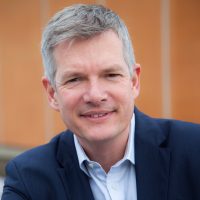Miracles are Possible

Tim Stuchtey
Brandenburg Institute for Society and Security; German University of Digital Science
Dr. Tim H. Stuchtey is a Geoeconomics Non-Resident Senior Fellow at AGI. He is the executive director of the Brandenburgisches Institut für Gesellschaft und Sicherheit (BIGS), a homeland security think-tank based in Potsdam, Germany. He is also Professor for Economics of Cybersecurity at the German University of Digital Science in Potsdam. He has served as Director of AGI's Business & Economics Program. He works on various issues concerning economic policy, the economy of security, the classic German ‘Ordnungspolitik,’ and the economics of higher education.
Dr. Stuchtey studied economics with a major in international trade and international management and graduated in 1995 from the Westfälische Wilhelms-Universität in Münster. In 2001 he earned a Ph.D. from the Technische Universität Berlin in economics, which he obtained for his work in public finance and higher education policy. He worked as an economist for the German Employers Association and as a university administrator both at Technische and Humboldt-Universität Berlin. He was also the managing director for the Humboldt Institution on Transatlantic Issues, a Berlin-based think tank affiliated with Humboldt-Universität.
He has published a number of articles, working papers, and books on the security industry, homeland and cybersecurity issues, higher education governance and finance and on other questions of the so-called ‘Ordnungspolitik.’
In light of the current economic crisis, Americans sometimes wonder why Germany, the world exporting champion, is not taking more action to spur on its economy. Dr. Tim Stuchtey, Senior Fellow and Director of the Business and Economics Program at AGI, writes that to understand Germany’s actions (or lack thereof), one must understand the concept of Ordnungspolitik and how it has shaped Germany’s economic policy over the past sixty years. In his essay, Dr. Stuchtey gives an overview of Ordnungspolitik and suggests ways how this concept can help to end the current crisis.








